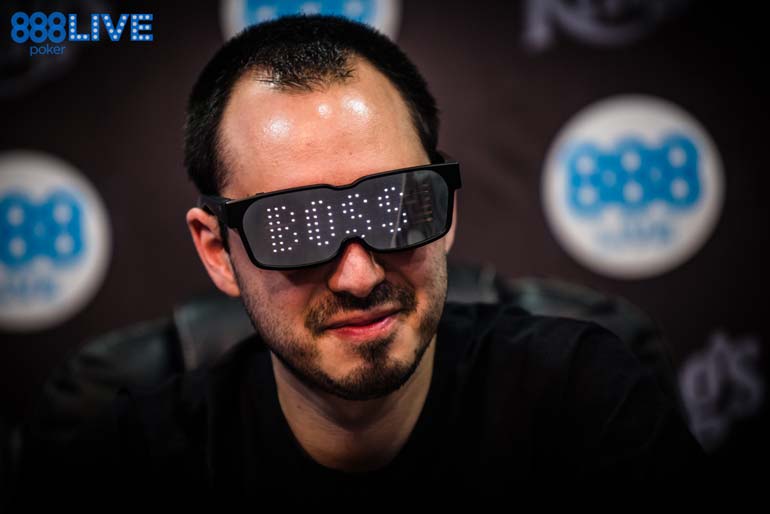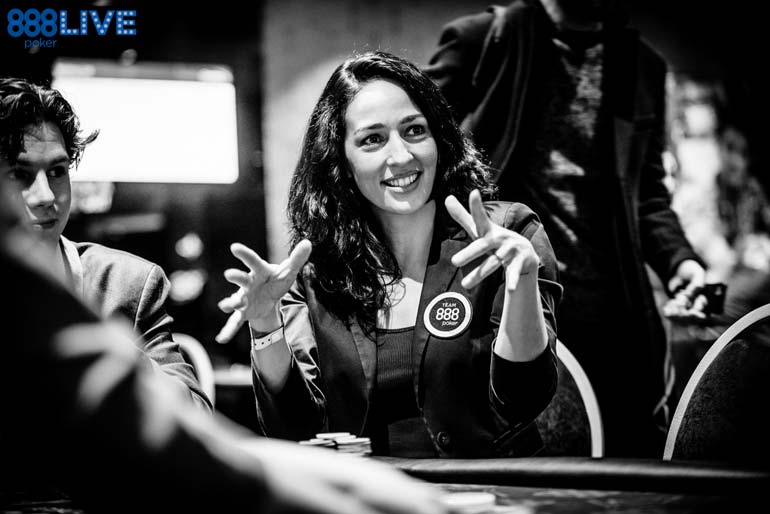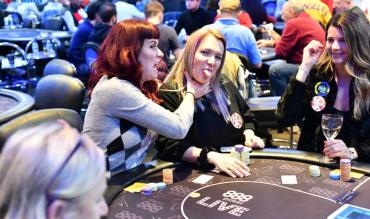Life is full of unwritten dos and don'ts:
- Do keep your word
- Don’t eat the last cookie
- Never agree that she/he/they ‘look(s) big in this.’
- Definitely don’t give your last marble to a guy that’s trying to kill you (RIP Ali. Sadface)
Whatever it is, these little rules help life run smoothly and reduce the likelihood of you getting walloped in a pub car park.
Poker is no exception. Good etiquette is almost as crucial to the game as chips and cards, which is surprising. The whole game is literally about lying and manipulating your way to your opponent's money!
We’ll take a good look at the following aspects of poker etiquette in this article:
Table of Contents
So, What is Etiquette?
Dictionary.com defines etiquette as:
“Observance of the formal requirements governing behaviour in polite society.”
This definition may sound like something written by someone with a monocle, eating canapes at a high-end astronomy convention.
So, let’s simplify:
Etiquette is the act of ‘doing something in a classy, honourable and polite way – So, not being a bit of a prat.
The interesting thing about etiquette, though, is that it’s entirely optional. Correct bathroom etiquette, for example, involves throwing your tissues away, flushing the chain and washing your hands.
But nothing is preventing you from ignoring all those supposed “rules”.
Poor etiquette is not only optional but also usually entirely within the rules.
Remember that time Mayweather sucker punched Victor Ortiz while he was apologising to him?
Awful etiquette, but as legal as cinnamon in coffee. (Trust me, try it!)
What Is Poker Etiquette?
 What Is Poker Etiquette?
What Is Poker Etiquette?
However, when it comes to poker, things aren’t quite as straightforward as the bathroom example above. There is often disagreement about what classifies as good and bad etiquette.
The whole Will Kassouf ‘speech play’ drama at the 2016 WSOP is a great example.
In the run-up to the final two tables, Kassouf was very active verbally. Anyone who knows Kassouf personally can attest to his ‘motor mouth’. But he was particularly chatty in this event.
- Hand after hand, Will bombarded his opponents with questions, taunts and what he classified as ‘speech play’.
- This strategy was highly distracting.
- It made it extremely difficult for opponents to think clearly when playing against him.
If you look at the footage, which is available on YouTube, sparks were undoubtedly flying. Many players believed that Kassouf was being ‘abusive’, with Will himself (along with others) seeing it as clever, legal strategy.
It’s a grey area in terms of etiquette. Despite many players being on Will’s rail, they feel torn.
Whether you think Will crossed the line or not, it was a great spectacle, nonetheless.
Poker Etiquette in Practice
- Things that help the game run smoothly, pleasantly, and professionally are good etiquette
- While things that annoy, upset, or attempt to gain advantage are not.
Here are a few more examples:
- Showing Strong Hands First
Technically, the last aggressor should be the first to expose their hand in a showdown. Their opponents would have made the call. But it is good etiquette to reveal your hand first if you are confident that it is best.
Say you have 7♥8♥ on Q♥J♥6♥2♣4♣ and your opponent calls your bet. It’s polite to announce ‘flush’ as soon as your opponent calls. This play keeps the game flowing.
- The Slow Roll
The exact opposite of this is the dreaded ‘slow roll’. Players take a deliberately long time to call an all-in with a very strong hand. This play is especially egregious when your opponent has already shown or announced a weaker hand.
Slow rolls are poor etiquette. They slow the game down, give your opponent a false hope of winning the hand, and are pretty disrespectful.
There are times when slow-rolling can be fun among friends. But for the most part, it’s frowned upon in poker.
Shaun Deep famously slow-rolled Mike Matusow with quads in a televised cash game a few years ago. Mike’s reaction says it all.
- Asking to See Mucked Cards
It’s okay (and within your right) to request to see your opponents’ cards in situations where you can gain is a lot of information. But some people consider it to be bad etiquette to ask to see mucked cards in the following scenarios –
- The pot is trivial
- You just stacked your opponent
- Excessive Tanking
It’s totally fine to take time with big decisions. But taking an unnecessarily long amount of time with most of your decisions is poor etiquette. It slows the game down.
For obvious reasons, this is incredibly frustrating for the other players –
- It lowers the hands seen per hour
- Negatively impacts the fun factor
- Impacts winning players’ hourly rate
Kassouf did this a lot at the 2016 WSOP. The footage shows Will habitually tanking with hands like 93o from early position preflop. So, it seems as though he was doing this to tilt the other players, attempting to make them play worse.
It’s not great etiquette, but it worked.
- Not Paying Attention or Talking While in a Hand
This unwritten rule is pretty much the same as excess tanking. It slows the game down. If you have to take a phone call or deal with something else, the polite thing to do is sit out.
- Calling the Clock Too Soon
Likewise, calling the clock without allowing the player an adequate amount of time to decide is poor etiquette. Calling the clock is within your rights as a player. But it’s polite to give the player more time for bigger decisions.
What classifies as an acceptable amount of time is a questionable area, especially in tournaments where time is a huge concern. Typically, a fair amount of time will consider the size of the pot and the seriousness of the decision.
- Talking loudly during a hand
Although it’s against the rules to discuss a hand, there’s no law about talking about something unrelated. Say someone has a big pot or tough decision, though. Good etiquette says you should be quiet and give players time to think.
- Hiding Your Stack Size
In most card rooms, the rules state that you have your big chips at the front. But it’s very easy to announce the wrong amount or mask your stack size to work in your favour. This bad etiquette can alter your opponent’s decision.
Doug Polk breaks down a good example here:
The Benefits of Good Poker Etiquette
But if there are no official etiquette rules, why should anyone follow them?
Especially if playing with poor etiquette might give us an advantage?
Well, it’s all about creating the best poker experience. When players work together to be polite and respectful at the tables, it makes the whole process of playing poker far more enjoyable.
You’d struggle to find anyone who’d disagree that good etiquette makes life at the poker table far more pleasant.
Even players who ignore good etiquette typically know they are breaking the unwritten rules and being a jackass. They just don’t care.
To these players, being a bit rude is worth the advantage they think they can get by playing a little dirty. This thought process is fine in theory. But it’s pretty short-sighted.
The whole poker ecosystem relies on the majority of players upholding good etiquette.
It’s a BOLD claim. But think about it.
- Professional players spend a lot of time at the tables.
- They take money from the poker economy,
- So, new and losing players’ deposits fuel the whole system.
There’s nothing fun about losing money. So, these players aren’t likely to continue if players are being rude and obnoxious or ruining the playing experience.
 The Benefits of Good Poker Etiquette
The Benefits of Good Poker Etiquette
What To Do If Someone Is Being Rude?
It’s only human to want to retaliate when someone is being impolite at the tables. But the problem with poker etiquette is that it only works if everyone follows suit.
It’s a bit like pushing a car down a road:
- If everyone does their fair share, then it should be pretty easy to move.
- But if someone stops pushing, everyone else follows suit.
- The whole process grinds to a halt.
As a result, the best thing to do when someone is being rude at the tables is to ignore it. But this is far more easily said than done. The poker table is a hyper-competitive environment where money is at risk.
This fact alone is enough to have emotions on a knife’s edge. If someone laughs in your face and says, ‘thank you’ as they scoop in your chips, it’s disrespectful and infuriating.
With that said, the last thing you want to do is begin a vicious back and forth of rudeness with someone. Not only will this ruin the experience for everyone involved, but it might also cause you to make an expensive mistake
- You won’t know, for sure, if the interaction is affecting the way your opponent is playing against you or not.
When faced with poor etiquette at the tables, it’s vital to maintain your cool. Your opponent may consider you a superior player. They may be trying to tilt you on purpose to make you play worse.
Smile to yourself and take the compliment.
 What To Do If Someone Is Being Rude?
What To Do If Someone Is Being Rude?
But most importantly, there’s a massive difference between a player cheering when they win a pot and someone rubbing it in your face - telling you how terrible you play.
While both can be considered poor etiquette, the former is far more likely to be an excited human. They’re simply innocently expressing their happiness at THEM winning more than the fact it’s at YOUR expense.
Remember that your opponent’s antics are most likely the consequence of not knowing how to win graciously because they are not used to it.
Accomplished players understand how essential losing players are to their overall profitability.
Rudeness is typically the sign of an arrogant, over-confident (or insecure) losing player.
These player types are great for your bankroll.
Be Mindful of New Players
It’s also worth reminding yourself that your opponent might not know better. They could be new to the game and utterly unaware that cheering or saying ‘thanks’ when you win a pot are poor etiquette. You probably didn’t when you started either.
Unfortunately, though, many new players get berated for slow-rolling. In reality, they were just trying to work out what hand they had, or if a flush beats a straight.
Yes, they slow-rolled, but it was entirely by accident. You could call it a noob-roll…
New players bring in a healthy supply of deposits to the poker ecosystem. As a result, you must protect these kinds of newer players at the table.
Protecting Newer Players
Say you see someone being rude to a new payer, criticising them or jeopardising the enjoyment or poker experience in any other way. Do what you can to stop it.
- Don’t let players be rude to each other.
- Their poker experience means everything
- It’s your job as a senior player to protect it.
- Try something as simple as cracking a joke.
- Open a conversation with the newbie.
- Also, a quiet word with the culprit won’t hurt either.
A table where everyone is conducting themselves respectfully and practising good etiquette will enrich new (and old) players’ experiences.
It will make them feel welcome and safe.
So, there you have it.
Poker Etiquette 101: Try to make everyone’s experience at the table as enjoyable as possible.


